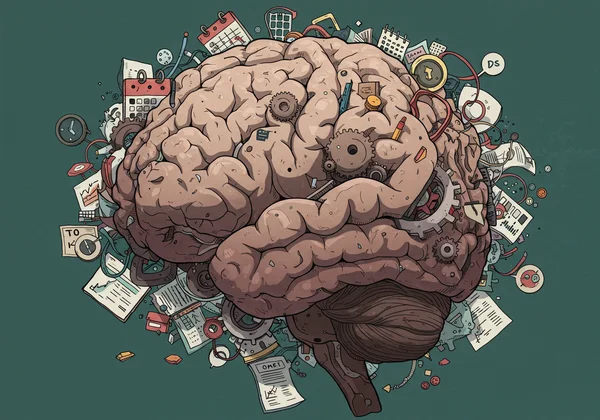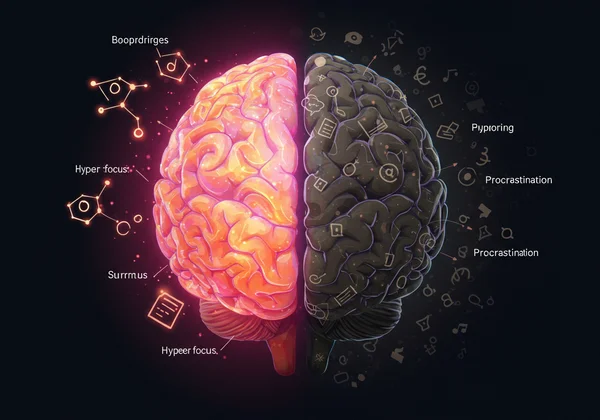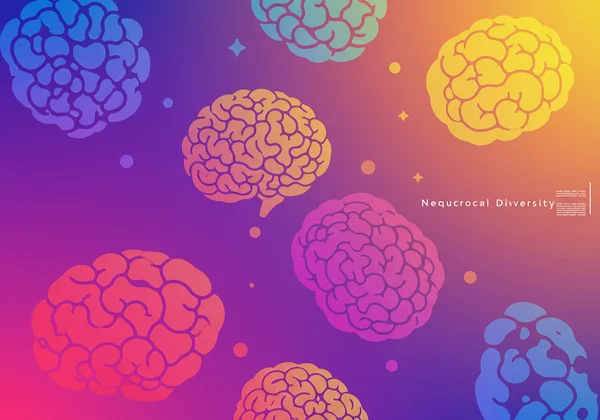Am I Neurodivergent? Unraveling ADHD, Laziness, and Executive Dysfunction with Our Test
July 6, 2025 | By Morgan Hayes
Ever wonder if you're lazy, or if there's something more to your struggles with focus and motivation? Many neurodivergent individuals, especially those with ADHD, grapple with these feelings, often blaming themselves for what are actually unique neurological differences. If you've asked, 'Am I neurodivergent, or just weird, lazy, or anxious?', this article is for you. We'll dive into executive dysfunction symptoms and the unique ways neurodivergent brains handle motivation, offering the clarity and validation you deserve. Ready to explore your unique neurological profile? Begin your journey of self-discovery with our free neurodivergent test today.
Why You're Not Lazy: Understanding the "Lazy or ADHD" Myth
The idea of being "lazy" is often tied to a perceived lack of effort or willpower. However, for many neurodivergent individuals, struggles with initiation, focus, and follow-through stem from how their brains are wired, not from a moral failing. It's time to reframe this common misconception.
The Stigma of "Laziness" in Neurodivergent Lives
From childhood, many people who are later identified as neurodivergent are labeled "lazy," "unmotivated," or "not trying hard enough." This stigma of "laziness" can lead to profound self-blame and shame. Imagine genuinely wanting to complete a task but feeling an invisible wall preventing you from starting. This isn't laziness; it's a genuine internal barrier that traditional motivational techniques often fail to address. Understanding this distinction is the first step toward self-acceptance.

Shifting Perspective: From Moral Failing to Neurological Difference
Instead of viewing challenges as personal shortcomings, we can shift our perspective to neurological differences. A neurodivergent brain processes information, regulates attention, and manages tasks in unique ways. What looks like "laziness" from the outside might actually be a manifestation of executive dysfunction, a term that describes difficulties with the brain's "management system." Embracing this shift is key to a more accurate, compassionate understanding of yourself.
Executive Dysfunction Symptoms Explained
So, what exactly is executive dysfunction? It's not a diagnosis in itself, but rather a set of challenges related to the brain's executive functions. These are the higher-level cognitive skills that control and coordinate other abilities and behaviors. When these functions don't operate typically, daily tasks can feel overwhelmingly difficult.
Core Areas Affected: Planning, Focus, & Task Initiation
Executive dysfunction symptoms can manifest in several core areas, making everyday life a significant hurdle. These include difficulties with planning (organizing steps to achieve a goal), focus (sustaining attention on a task), and task initiation (getting started on something). Imagine a meticulously planned agenda, yet the sheer mental effort to begin is monumental. This isn't about not wanting to do it; it's about a specific brain function not firing as expected. These challenges are often central to what many experience as a struggle with motivation.

How Executive Function Differs from Simply "Not Wanting To"
Distinguishing impaired executive function from simply "not wanting to" do something is vital. "Not wanting to" implies a choice based on preference. Executive dysfunction, however, describes a difficulty in ability. It's like having a car where the engine sputters despite a full tank of gas and an eager driver. The desire is there, but the mechanism for execution is impaired. This distinction provides a compassionate lens for understanding your own experiences.
ADHD and Motivation: A Unique Relationship
ADHD (Attention-Deficit/Hyperactivity Disorder) is one of the most commonly recognized forms of neurodivergence where motivation works uniquely. It's not that individuals with ADHD lack motivation; rather, their motivational system is different from what's considered "neurotypical." This can lead to misconceptions about their capabilities and effort.
The Role of Dopamine and Interest-Based Motivation
At the heart of ADHD and motivation lies the neurotransmitter dopamine. Dopamine plays a key role in the brain's reward system, influencing motivation, pleasure, and attention. In ADHD brains, dopamine regulation can be atypical, leading to a need for higher stimulation or interest to engage. This explains interest-based motivation: tasks that are genuinely exciting or novel might lead to intense focus, while mundane or long-term tasks are incredibly difficult to start or sustain. It’s not about willpower; it’s about brain chemistry.
Hyperfocus vs. Procrastination: Two Sides of the Same Coin
This unique motivational profile can result in fascinating paradoxes, like hyperfocus vs. procrastination. Hyperfocus is the intense, sustained concentration on a task that is engaging or rewarding, often to the exclusion of everything else. It can be a superpower for creative or deeply interesting work. Conversely, procrastination often occurs with tasks that lack immediate stimulation or intrinsic interest, leading to significant delays and stress. Both are two sides of the same neurodivergent traits quiz coin, illustrating the unique way the ADHD brain prioritizes and engages with tasks based on perceived interest and reward.

"Am I Neurodivergent or Just Weird/Anxious/Different?"
Many individuals ponder, "Am I neurodivergent or just weird/anxious/different?" This question highlights a common struggle to categorize deeply felt internal experiences. The good news is, you're likely not "weird." You might be experiencing traits that align with a broad and vibrant spectrum of human neurological diversity. Embracing this perspective can be incredibly freeing.
The Broad Spectrum of Neurodivergence
Neurodiversity is a paradigm that views neurological differences as natural and valuable human variations. This includes, but is not limited to, ADHD, autism (autistic person), dyslexia, dyspraxia, Tourette's Syndrome, and many more. Understanding the broad spectrum of neurodivergence helps individuals see their unique cognitive profiles not as disorders to be cured, but as distinct ways of perceiving and interacting with the world. This inclusive perspective celebrates our differences and acknowledges that a "typical" brain is just one of many ways to be.
Finding Validation and Self-Acceptance
For many, discovering the concept of neurodivergence brings immense relief and a sense of belonging. It helps in finding validation and self-acceptance for lifelong struggles that were once blamed on personal failing. Realizing that your brain functions differently, rather than defectively, can be a powerful catalyst for positive change. It shifts the focus from "what's wrong with me?" to "how can I best support my unique brain?" This journey of self-understanding is empowering.

Moving Beyond Self-Blame: Your Path to Understanding
Moving beyond self-blame is a crucial step towards embracing your authentic self. The "lazy or ADHD" question illustrates a common societal misunderstanding of neurological differences. By understanding concepts like executive dysfunction and the unique way ADHD and motivation interact, you can begin to shed years of internalized criticism. Your brain isn't broken; it's simply wired in a distinct, often brilliant, way.
If this article has resonated with you, and you're curious to explore your own neurological profile further, we invite you to take a significant step towards self-understanding. Our free, easy-to-use Neurodivergent Test offers a preliminary screening to help you identify potential neurodivergent traits. It's designed to be a supportive starting point, not a diagnostic tool, providing insights to empower your journey. Discover more about yourself and find a sense of belonging within the neurodiverse community by taking our neurodivergent traits quiz today.
Frequently Asked Questions About Neurodivergent Traits & Motivation
What are the signs of being neurodivergent?
What are the signs of being neurodivergent? Common signs can vary widely depending on the specific neurotype, but often include differences in social communication, sensory processing, attention regulation, executive functions (like planning and organization), and learning styles. These are not necessarily deficits, but distinct ways of experiencing the world. Our neurodivergent screening tool can offer preliminary insights into these areas.
Can you be neurodivergent and not have ADHD or autism?
Yes, absolutely. Can you be neurodivergent and not have ADHD or autism? The term neurodivergence is broad, encompassing many neurological differences beyond just ADHD and autism. This includes conditions like dyslexia, dyspraxia, Tourette's Syndrome, dyscalculia, and more. Each neurotype presents a unique set of cognitive challenges and strengths. Our site offers a comprehensive neurodivergent test that touches on various aspects.
How do you get tested for neurodivergence?
How do you get tested for neurodivergence? While online screening tools like our neurodivergent test can provide valuable initial insights, a formal diagnosis requires a comprehensive evaluation by a qualified professional. This might include a psychologist, psychiatrist, or neurologist, who will conduct interviews, observations, and standardized tests. Our free online tool is a great first step to understand yourself better and decide if professional evaluation is something you want to pursue. Start your journey with our free neurodivergent test.
What are the strengths of a neurodivergent brain?
What are the strengths of a neurodivergent brain? Neurodivergent individuals often possess remarkable strengths. Autistic individuals may exhibit exceptional attention to detail, strong pattern recognition, and deep focus on special interests. Those with ADHD often demonstrate immense creativity, innovative problem-solving, and the ability to hyperfocus on engaging tasks. Dyslexic individuals can excel in spatial reasoning and holistic thinking. Embracing these distinct abilities contributes to a richer, more diverse world. Discover your unique profile by taking our neurodivergence test.